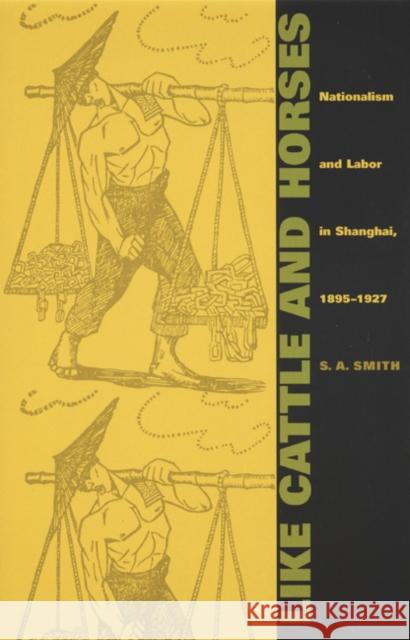Like Cattle and Horses: Nationalism and Labor in Shanghai, 1895-1927 » książka
Like Cattle and Horses: Nationalism and Labor in Shanghai, 1895-1927
ISBN-13: 9780822327837 / Angielski / Twarda / 2002 / 384 str.
Like Cattle and Horses: Nationalism and Labor in Shanghai, 1895-1927
ISBN-13: 9780822327837 / Angielski / Twarda / 2002 / 384 str.
(netto: 480,17 VAT: 5%)
Najniższa cena z 30 dni: 482,79
ok. 30 dni roboczych
Bez gwarancji dostawy przed świętami
Darmowa dostawa!
In Like Cattle and Horses Steve Smith connects the rise of Chinese nationalism to the growth of a Chinese working class. Moving from the late nineteenth century, when foreign companies first set up factories on Chinese soil, to 1927, when the labor movement created by the Chinese Communist Party was crushed by Chiang Kai-shek, Smith uses a host of documents journalistic accounts of strikes, memoirs by former activists, police records to argue that a nationalist movement fueled by the effects of foreign imperialism had a far greater hold on working-class identity than did class consciousness.
While the massive wave of labor protest in the 1920s was principally an expression of militant nationalism rather than of class consciousness, Smith argues, elements of a precarious class identity were in turn forged by the very discourse of nationalism. By linking work-related demands to the defense of the nation, anti-imperialist nationalism legitimized participation in strikes and sensitized workers to the fact that they were worthy of better treatment as Chinese citizens. Smith shows how the workers refusal to be treated like cattle and horses (a phrase frequently used by workers to describe their condition) came from a new but powerfully felt sense of dignity. In short, nationalism enabled workers to interpret the anger they felt at their unjust treatment in the workplace in political terms and to create a link between their position as workers and their position as members of an oppressed nation. By focusing on the role of the working class, Like Cattle and Horses is one of very few studies that examines nationalism from below, acknowledging the powerful agency of nonelite forces in promoting national identity.
Like Cattle and Horses will interest historians of labor, modern China, and nationalism, as well as those engaged in the study of revolutions and revolt.
"











